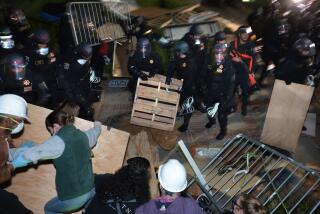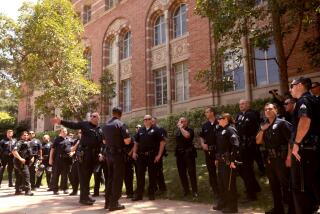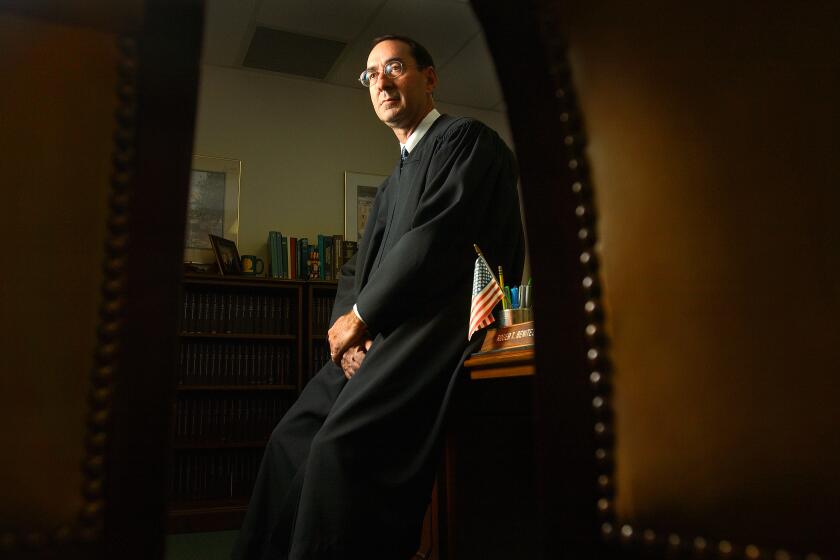Members of Rampart Panel Are Named
Seeking to move the Los Angeles Police Department past an embarrassing and costly chapter in its history, the Los Angeles Police Commission will announce the appointment today of prominent lawyers and law professors to a 10-member panel that will review the Police Department’s response to the Rampart corruption scandal.
Led by civil rights lawyer Constance L. Rice, the group will examine the institutional failures of the LAPD on Rampart and consider whether structural changes have been made to prevent their recurrence, commission President Rick Caruso said.
The panel includes academics and lawyers with strong backgrounds in law enforcement and reputations as vocal but reasonable critics of the LAPD, Caruso said. The group includes business attorneys, civil rights lawyers and former prosecutors. Many of its members have served on other special committees formed to review LAPD actions in widely publicized cases, including the Rodney King police beating, the 1992 L.A. riots and the Rampart scandal.
“They’ve showed the desire and the determination to push the department forward, to make it the best department it could be,” Caruso said. “They are experts and they’ve been very critical and they’ve been very upfront. And if we’re going to be serious, we should bring in critics and use their expertise.”
In addition to Rice, the panelists are:
* Henry S. Barbosa, a former Los Angeles County deputy district attorney who has been in private practice for 27 years, specializing in representing local municipalities.
* USC law professor and constitutional law specialist Erwin Chemerinsky, who was part of a group that reviewed the Rampart scandal for the Los Angeles police union. He also served as chairman of the city’s Charter Reform Commission.
* Jan Handzlik, who recently served as deputy general counsel to the Rampart Independent Review Panel, which was appointed by the Police Commission in 2000. He also participated in the Christopher Commission, which investigated allegations of racism and excessive force in the LAPD after the King beating.
* Loyola law professor Laurie Levenson, who collaborated on the 2000 report on the Rampart scandal that had been commissioned by the police union. She also served as a volunteer counsel on the Webster Commission, which examined the LAPD response to the 1992 riots.
* Stephen A. Mansfield, a former federal prosecutor who served as deputy general counsel for the Rampart Independent Review Panel and headed the United Nations team that conducted the preliminary war-crimes investigation in Rwanda.
* Andrea S. Ordin, a former U.S. attorney who served on the Christopher Commission and was an inaugural member of the advisory board of the National Center for Women and Policing.
* Carol A. Sobel, who worked for the American Civil Liberties Union in Los Angeles for more than 20 years. She was part of the panel that reviewed Rampart at the request of the police union.
* Maurice Suh, a former assistant U.S. attorney who specialized in government corruption and fraud.
* Edgar Twine, who serves as a hearing examiner for the Police Commission and is a civilian member of the LAPD Board of Rights.
Even though several city committees and the Los Angeles County Grand Jury investigated the Rampart scandal, Caruso and Chief William J. Bratton said in February that a new committee was needed. Bratton, who became chief last October, was dissatisfied with the quality of the LAPD’s internal review of Rampart and thought a new effort was needed to reassure the public that the department had addressed all the issues raised by the scandal.
The scandal broke in September 1999 after ex-Officer Rafael Perez told authorities as part of a plea deal that he and other anti-gang and narcotics officers in the Rampart Division had routinely planted evidence, framed suspects and covered up unjustified shootings by police.
Shortly thereafter, then-Chief Bernard C. Parks promised a report that would document “the exact nature and disposition of each allegation” that surfaced in the corruption probe. Parks initially said the “after-action report” would be presented to the public by early 2001.
But, as the inquiry continued, the chief and other department officials stopped talking publicly about the report, which was never issued.
When she was named to head the committee in May, Rice said she didn’t think the LAPD had gotten to the bottom of the scandal, in which nine officers have been convicted of crimes ranging from planting evidence to assault and drug theft.
More to Read
Start your day right
Sign up for Essential California for news, features and recommendations from the L.A. Times and beyond in your inbox six days a week.
You may occasionally receive promotional content from the Los Angeles Times.






